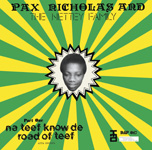|
|
 |
Dusted Reviews
Artist: Pax Nicholas and the Nettey Family Album: Na Teef Know de Road of Teef Label: Daptone Review date: Nov. 17, 2009 |

|
|
|
 |
It’s not often that a suppressed album from Fela Anikulapo Kuti’s band/nation/extended family Africa 70 pops out into the light of day. Still rarer is it when the album in question was suppressed not by the military dictatorship of 1970s Nigeria, but by Fela himself. Such is the case, however, with the Daptone release Na Teef Know de Road of Teef. This short recording (33 minutes, four cuts total) was recorded by Fela’s band under the leadership of Pax Nicholas (Nicholas Ado-Nettey) in Ginger Baker’s studio in Lagos, apparently without the knowledge of Fela himself. Pax Nicholas, trained as a traditional drummer in his native Ghana, joined Africa 70 in 1971, contributing percussion and backing vocals through the entire tumultuous period of the Kalakuta republic. During the first few years of his time with Fela, Nicholas recorded two solo albums, Mind Your Own Business in 1971 and Na Teef in 1973. Fela was unhappy with the first solo album, but let it go. The second album, however, recorded with his own musicians in his own studio, was another matter: Fela shut down production, and the recording went underground until a vinyl copy was unearthed recently by Frank Gossner (DJ Soulpusher of Voodoofunk.com).
In retrospect, if Fela were concerned about competition, he should have relaxed a bit. The musicianship is, of course, superb – it is, after all, Afrobeat’s premier band near its peak – and each song shows the irresistible drive of Fela’s music. Nicholas’s vocals, however, are disappointing when compared with Fela: his voice is weak and at times uncertainly pitched as he spits out unimaginative lyrics (sample from “You:” “You are a woman / I am a man / You are a man / I am a woman / You can say what you like / woman / You can see what you know”). Perhaps a comparison to Fela’s rich voice and complex, politically charged lyrics is unfair; even his two sons, Femi Kuti and Seun Kuti, struggle at times to match their father. Nevertheless, comparison is unavoidable, especially given the high-quality instrumentals of all four cuts. Sad to say, the vocals are mostly a distraction from the very solid groove laid down by the band who, one suspects, operated largely on their own.
In 1978, after several years of attempts by the Nigerian military to “arrest the music” and destroy Fela’s anti-corruption efforts, Nicholas (and most of the rest of the band) left Africa 70 while it was in Berlin for the Jazz Festival. Nicholas remains in Berlin to this day, where he continues to perform. Na Teef provides an interesting glimpse into the heyday of one of Africa’s great contributions to global popular music, perhaps ironically highlighting the vital charisma of Afrobeat’s founder, Fela Anikulapo Kuti, and the power of his voice.
By Richard Miller
|







